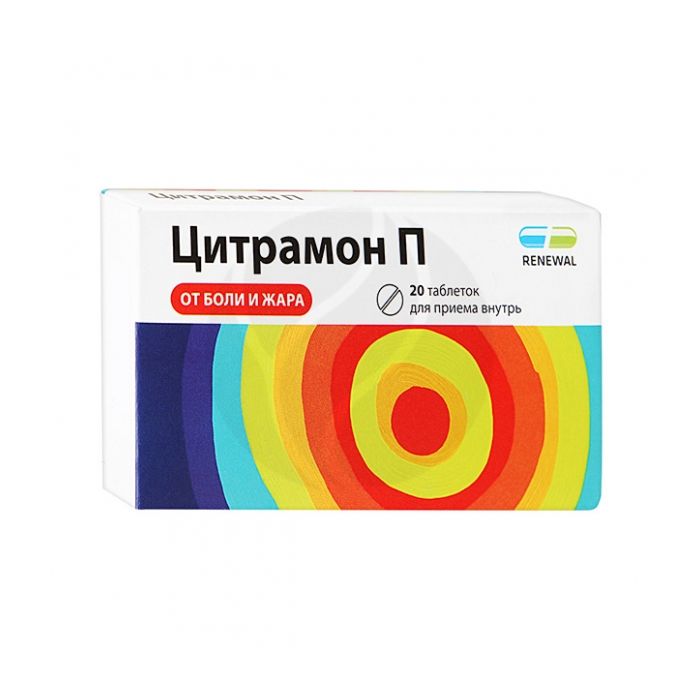Citramon P tablets, No. 20
Expiration Date: 05/2027
Russian Pharmacy name:
Цитрамон П таблетки, №20
Pain syndrome of mild and moderate severity (of various origins): headache; migraine; toothache; neuralgia; myalgia; arthralgia; algodismenorrhea.
Feverish syndrome: with acute respiratory infections; with the flu.
Inside (during or after meals) take every 4 hours. On average, take 3-4 times / day. The maximum frequency of admission is 8 times / day. The course of treatment is no more than 7-10 days.
In case of impaired renal or liver function, the interval between doses is at least 6 hours.
The drug should not be taken for more than 5 days when prescribed as an anesthetic and more than 3 days as an antipyretic. Other doses and regimens are determined by the doctor.
Pills
1 tab.
acetylsalicylic acid 240 mg
paracetamol 180 mg
caffeine 30 mg
Hypersensitivity to the components of the drug;
erosive and ulcerative lesions of the gastrointestinal tract (in the acute phase);
gastrointestinal bleeding;
aspirin asthma;
hemophilia;
hemorrhagic diathesis;
hypoprothrombinemia;
portal hypertension;
vitamin deficiency K;
renal failure;
I and III trimesters of pregnancy;
lactation period (breastfeeding);
deficiency of glucose-6-phosphate dehydrogenase;
severe arterial hypertension;
severe course of ischemic heart disease;
glaucoma;
increased excitability;
sleep disorders;
surgical interventions accompanied by bleeding
children's age (up to 15 years - the risk of developing Reye's syndrome in children with hyperthermia against the background of viral diseases).
With care: gout, liver disease.
pharmachologic effect
Combined drug.
Acetylsalicylic acid has antipyretic and anti-inflammatory effects, relieves pain, especially caused by the inflammatory process, and moderately inhibits platelet aggregation and thrombus formation, improves microcirculation in the focus of inflammation.
Caffeine increases the reflex excitability of the spinal cord, stimulates the respiratory and vasomotor centers, dilates the blood vessels of skeletal muscles, brain, heart, kidneys, reduces platelet aggregation; reduces drowsiness, fatigue, increases mental and physical performance. In this combination, a small dose of caffeine has practically no stimulating effect on the central nervous system, however, it helps to normalize the tone of the cerebral vessels and accelerate blood flow.
Paracetamol has an analgesic, antipyretic and extremely weak anti-inflammatory effect, which is associated with its effect on the center of thermoregulation in the hypothalamus and a weakly expressed ability to inhibit the synthesis of prostaglandins in peripheral tissues.
Side effect
From the digestive system: gastralgia, nausea, vomiting, hepatotoxicity, erosive and ulcerative lesions of the gastrointestinal tract.
From the urinary system: nephrotoxicity,
Allergic reactions: skin manifestations, Stevens-Johnson syndrome, Lyell's syndrome, bronchospasm.
On the part of the cardiovascular system: tachycardia, increased blood pressure,
With prolonged use: dizziness, headache, visual disturbances, tinnitus, decreased platelet aggregation, hypocoagulation, hemorrhagic syndrome (including nosebleeds, bleeding gums, purpura), kidney damage with papillary necrosis; deafness; Reye's syndrome in children (hyperpyrexia, metabolic acidosis, disorders of the nervous system and psyche, vomiting, liver dysfunction).
Application during pregnancy and lactation
It is contraindicated for use in the I and III trimesters of pregnancy and during lactation (breastfeeding).
Acetylsalicylic acid has a teratogenic effect; when used in the first trimester of pregnancy, it leads to a developmental defect - splitting of the upper palate; in the third trimester - to inhibition of labor (inhibition of prostaglandin synthesis), to the closure of the ductus arteriosus in the fetus, which causes hyperplasia of the pulmonary vessels and hypertension in the vessels of the pulmonary circulation.
It is excreted in breast milk, which increases the risk of bleeding in a child due to impaired platelet function.
Application for violations of liver function
With caution: liver disease.
Application for impaired renal function
Contraindicated in renal failure.
Application in children
Children under 15 years of age should not be prescribed medications containing acetylsalicylic acid, since in the event of a viral infection, they can increase the risk of Reye's syndrome. The symptoms of Reye's syndrome are prolonged vomiting, acute encephalopathy, and enlarged liver.
special instructions
Children should not be prescribed medications containing acetylsalicylic acid, since in the event of a viral infection, they can increase the risk of Reye's syndrome. The symptoms of Reye's syndrome are prolonged vomiting, acute encephalopathy, and enlarged liver.
With prolonged use of the drug, it is necessary to monitor the peripheral blood and the functional state of the liver.
Since acetylsalicylic acid slows down blood clotting, the patient, if he is to undergo surgery, must warn the doctor in advance about taking the drug.
Patients with hypersensitivity or with asthmatic reactions to salicylates or their derivatives, acetylsalicylic acid can only be prescribed with special precautions (in an emergency room).
Acetylsalicylic acid in low doses reduces the excretion of uric acid. In patients with a corresponding predisposition, this can in some cases provoke an attack of gout.
During treatment, you should stop using ethanol (increased risk of gastrointestinal bleeding).
Drug interactions
Enhances the action of heparin, indirect anticoagulants, reserpine, steroid hormones and hypoglycemic drugs.
Concomitant administration with other NSAIDs, methotrexate increases the risk of side effects.
Reduces the effectiveness of spironolactone, furosemide, antihypertensive drugs, as well as anti-gout drugs that promote the excretion of uric acid.
Barbiturates, rifampicin, salicylamide, antiepileptic drugs and other stimulants of microsomal oxidation contribute to the formation of toxic paracetamol metabolites that affect liver function.
Metoclopramide accelerates the absorption of paracetamol.
Under the influence of paracetamol, T1 / 2 of chloramphenicol increases 5 times. When taken again, paracetamol can enhance the effect of anticoagulants (dicoumarin derivatives).
The simultaneous use of paracetamol and ethanol increases the risk of developing hepatotoxic effects.
Caffeine accelerates the absorption of ergotamine.

